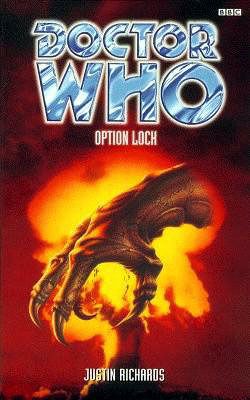
Longest Day by Michael Collier
In Brief: Yes, yes it was.
Plot of book: Doctor and Sam land on a lunar base in a distant system. The base is monitoring the nearby planet Hirath which suffers from temporal instability, or something. It turns out that the species that runs the base didn't originally build it but took over after it had been abandoned by the monstrous Kusks, who have now returned to claim the base and the planet below. Or something. They want both back for a probe which landed on the planet and is causing the rifts which (all together now) THREATEN THE ENTIRE GALAXY.
Or something.
And then at the end Sam thinks The Doctor is dead and leaves in an escape-shuttle.
Although The Doctor isn't dead and now has to go off to search for Sam. Why that is I don't know.
If this all seems fairly dismissive towards Longest Day it's because of the simple fact that the book is crap. Crap crap crap. Not awful crap though, but desperately boring crap. I think what the author *wanted* was a harrowing and horrific story of survival in a dangerous and unusual environment. But that goal is missed and Longest Day is filled with uninteresting characters wandering through a dry wasteland randomly being killed by a time-eddy or rampaging Kusk.
Or something.
Oh, and Sam whines a lot.
The problem isn't that the book is too nasty as there have been decent nihilistic Doctor Who novels in the past such as the 7th-Doctor New Adventures by Jim Mortimore (Parasite, Eternity Weeps, etc.). But those books were lifted by the author's skill and dark sense of humour. Everything in Longest Day is written with the utmost seriousness and solemnity, which just makes everything tedious and irritating.
However the poor quality of the book, especially after the underwhelming run of Eight Doctor adventures so far (with only 2 out of 9 books being decent), reflects the problem of Doctor Who in the late-1990s. Longest Day was originally published in March 1998, which was in that period of time when Doctor Who was at its lowest point of visibility ever. After the 1996 McGann movie had flopped in the US the prospect of any new series was mired in rights-hell (and public apathy). So for most people Doctor Who was a show that had been cancelled at least a decade ago (as many didn't actually know it had been on air at all past 1985) and was best left as a bit of silly childhood nostalgia.
So it's little wonder that the series is obviously suffering at this point. Doctor Who at the time was an idea on life-support, a distant memory held onto by only the most hard-core fans.
This was still a year before Russell T Davies' Queer As Folk appeared on TV and showed the world the truth about the lifestyle and relative normality of Doctor Who fans (oh, and gay men).
Still, none of this is an excuse for the book being so bad. Longest Day is simply one of the the dullest Doctor Who stories ever written and should never have been published. There's no spark of life to the story, just poorly fleshed-out characters wandering through a dull landscape with little purpose. It's one thing to have to deal with an alien planet that looks like a quarry and aliens with funny eye-lashes on TV due to budget constraints but surely the written word can manage something a bit more ambitious. It's bad enough having throw-backs to the story-style of the 1970s, but the landscape doesn't also have to match.
Although Collier is not alone as many authors of these books have done the same thing, gone for misplaced nostalgia rather than look for a new direction to take the series. But considering that these books were being aimed at long-time fans rather than new readers having obvious allusions to the past is somewhat understandable even though it is always the wrong thing to do with Who. Here's hoping that this rut gets broken soon, the series needs to look forwards again.
